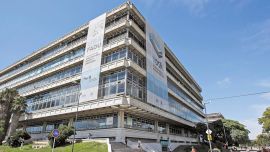Security Minister Patricia Bullrich says Argentina is interested in "adapting the Bukele model" – a reference to El Salvador President Nayib Bukele's hard-line approach to drug crime.
In comments reported by local media, Bullrich responded warmly to comments by the recently re-elected Salvadoran head of state that he would be happy to work and cooperate with President Javier Milei's government on security issues.
“We’re interested in adapting the Bukele model. Violence in Argentina is strong. Last weekend there were casualties at football [matches], it’s been a summer with permanent fights. The model is complicated, but we’re seeing the rise in gang violence, or confrontations at discos. We’re interested in working on that sort of violence," revealed Bullrich, who herself has a reputation as a hard-liner on crime.
Following his election win last weekend, Bukele said at a press conference last Sunday that he had already offered Argentina this government's help.
“We have officially offered minister Bullrich, not advice, but the cooperation they need and in all things security, which we have talked about, but also in any other matter,” said the El Salvador leader.
Quizzed about what help his government could provide, Bukele explained that it might be “technical” and related to "crime and their legislation."
Bukele sent his security minister to Buenos Aires for President Milei's inauguration last December 10 and Bullrich revealed that she had "talked about the problem" with her peer, specifically "how they had reduced crime.”
“We agreed to set up a visit there knowing that their problem is really difficult, really tough, but that they achieved a very significant drop. I was surprised my name came up, but apparently the minister mentioned it. We haven’t resumed talks about it,” said Bullrich.
Controversial approach
Bukele, who proclaimed himself re-elected on Sunday, February 4, before all votes were tallied, is at the height of his popularity: he has described himself as the “cool dictator” who rescued the country from gangs and gave it a true democracy.
This millennial 42-year-old publicist – the most popular president in Latin America according to the 2023 popularity rankings tracked by the Latinobarómetro consultancy firm – declared on the X social network last weekend that he had won by a landslide.
“El Salvador never had a democracy, and now for the first time in its history it does, and it’s not my claim, it’s the people’s,” he stated on Sunday, as he took questions from the press about whether his government would replace the nation's democratic system for another model.
Bukele's war on gangs is credited with slashing homicide rates and restoring security and dignity to citizens of what was once one of the world's most dangerous countries.
The price, say observers and victims, is paid in arbitrary arrests, inhumane detention, even torture – and fear of a whole new kind.
At his request, Congress declared a state of emergency in March 2022, under which over 75,000 alleged gang members were arrested without a warrant and the homicide figure fell drastically. About 7,000 have since been freed for a lack of evidence, but activists say many innocents – including minors – remain behind bars.
Human rights organisations have denounced arbitrary arrests, torture and deaths in prison. In response, Bukele accuses them of defending gang members.
The ‘anti-gang’ war has turned the “most dangerous country in the world into the safest country in the Western hemisphere,” the El Salvador leader said on Sunday, who claims that gangs have killed at least 120,000 people since the end of the nation's civil war in 1992.
Bukele's self-proclaimed victory “is the foreseeable result” of actions in his government “that have achieved an absolute concentration of power,” stated Tamara Taraciuk, director of the Rule of Law Program at the Inter-American Dialogue, based in Washington.
“Salvadorean democracy is at stake,” she added.
– TIMES/PERFIL/NA




















Comments